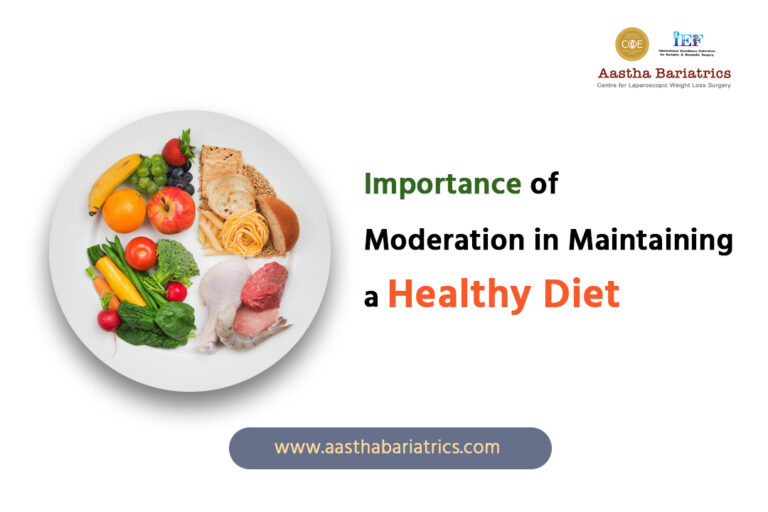Importance of Moderation in Maintaining a Healthy Diet
A healthy diet helps to protect against malnutrition in all its forms, as well as noncommunicable diseases (NCDs), including such as diabetes, heart disease, stroke and cancer.
Unhealthy diet and lack of physical activity are leading global risks to health.
Healthy dietary practices start early in life – breastfeeding fosters healthy growth and improves cognitive development, and may have longer term health benefits such as reducing the risk of becoming overweight or obese and developing NCDs later in life.
One of the keys to sustaining improvement in the way we eat is the ability to practise moderation in our diets. As a society, we tend to take an all or nothing approach to food, eating too much of something or trying to eliminate that food or category of food all together. That tendency towards extremes becomes even more obvious when we look at what’s happened to the food on the shelves of our local suppermarkets.
On the one hand, we have super sized everything, and on the other hand, we see claims like fat free and sugar free everywhere in the supermarket. These claims attract us because they are absolute. But, if we can master the skill of eating with moderation, then no single food needs to be forbidden. We can eat the foods we enjoy as long as we do not consume too much of them.

How much do we eat?
How much do we eat is an important question. And how to moderate our appetite is very hard for people. We are socialized to eat until we are full. That’s not a natural thing. And it is not a universal thing.
Ensure that at the end of the email you don’t say I am full and don’t ask your children if they are full. Instead, say I am no longer hungry. There is a difference between the two.
The moment at which you are no longer hungry is many bites before the time when you are stuffed. And we keep asking our children and family wrong questions. We say, are you full?
We should rather ask, are you satisfied? Are you still hungry? So you see, there are cultural ways and manners that help us deal with quantity in food.
And we have to look at things like portion size, the way we talk about food, and our relationship with food. Are people really looking for lots of calories when they eat?
These days people are looking for lots of food experience, an intense satisfying food experience. If you look at a country like France, and many other cultures too, they get more food experience with less food. And they do that partly by eating more slowly, eating better quality food.
There is a trade-off between quality and quantity, and the Indian food system is very much organized toward quantity. And in fact, this is one of the biggest factors responsible for obesity because of our tendency to consume enormous quantities of low-quality food.
This is not to suggest that the food we eat needs to be expensive, but we need to spend our food budget more wisely on the foods that will support both good health and happiness.
Many cultures have a rule that basically says stop eating before your are full. Japanese say hara hachi bu, eat until you are 80% full. That’s such a foreign concept to us, but you find this across board.
The Chinese say eat until you are 75% full, and the Quran too says that eat until you are two third full. However, we all overeat.
Next time when you are eating something, ask yourself a few questions about it.
Will this food bring me pleasure or am I eating is because it is a food feel? Eating food that does not give you pleasure is a form of taking empty calories, because they are empty calories, because they lack happiness. However, the very next question to ask is- is this food worthy of me? And by this I mean, will this food support me in achieving all of the things I want to achieve in the long run? If the answer is yes, then the very next question is how much of this will I need to satisfy?
Do not run behind satisfying your food cravings in a go. Each day should include moderate amounts of food that brings us pleasure. Moderation allows us to live at peace with our food.
Read also; The Cost of Bariatric Surgery in India
Why We Are?
- Asia's Trusted Bariatric Center
- Centre of Excellence
- Patient Trusted Highly Volume Bariatric Center in Mumbai
- EMI, Cashless & Mediclaim Facilities are Available
- Daily Patients Follow-up after Bariatric Surgery
- Patient Support Group Every Month
- Obesity Awareness Program
- Available with Latest Technologies
- 18+ Experience in Weight Loss Bariatric Surgery
- 300+ Weight Loss Diet Plan & Recipes
- Highly Trained & Experienced Bariatric Nutritionist
- Patient WhatsApp Chat Group
- & Many More
Medically reviewed by Dr. Manish Motwani, Bariatric & Metabolic Laparoscopic Bariatric Surgeon — Curated by Ruchika Bachwani







